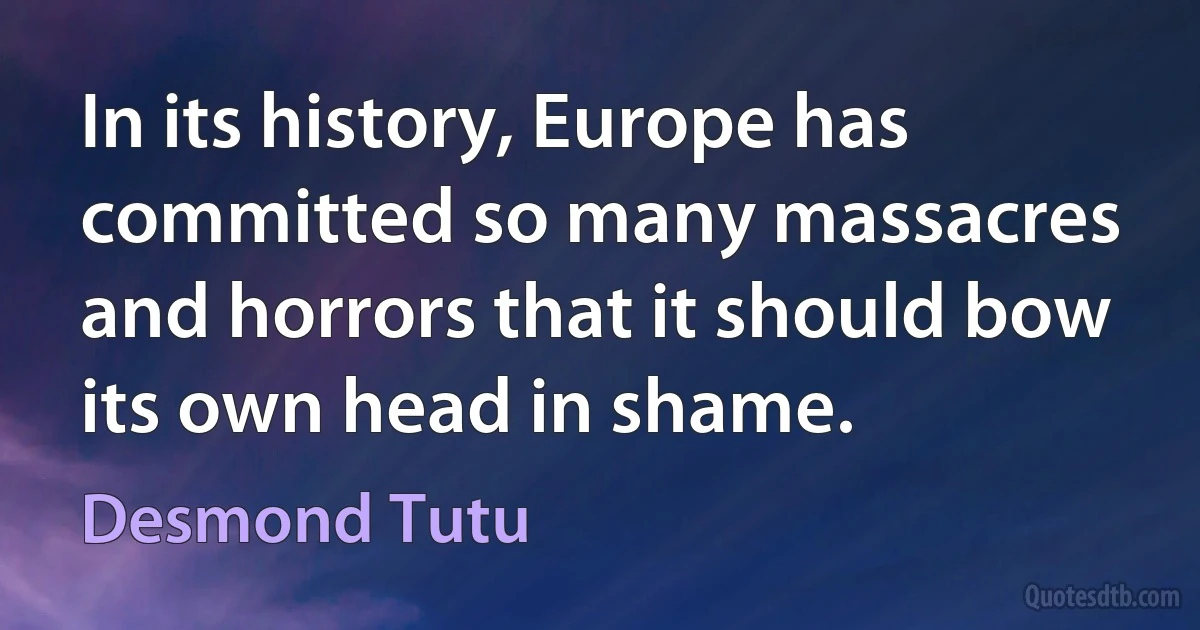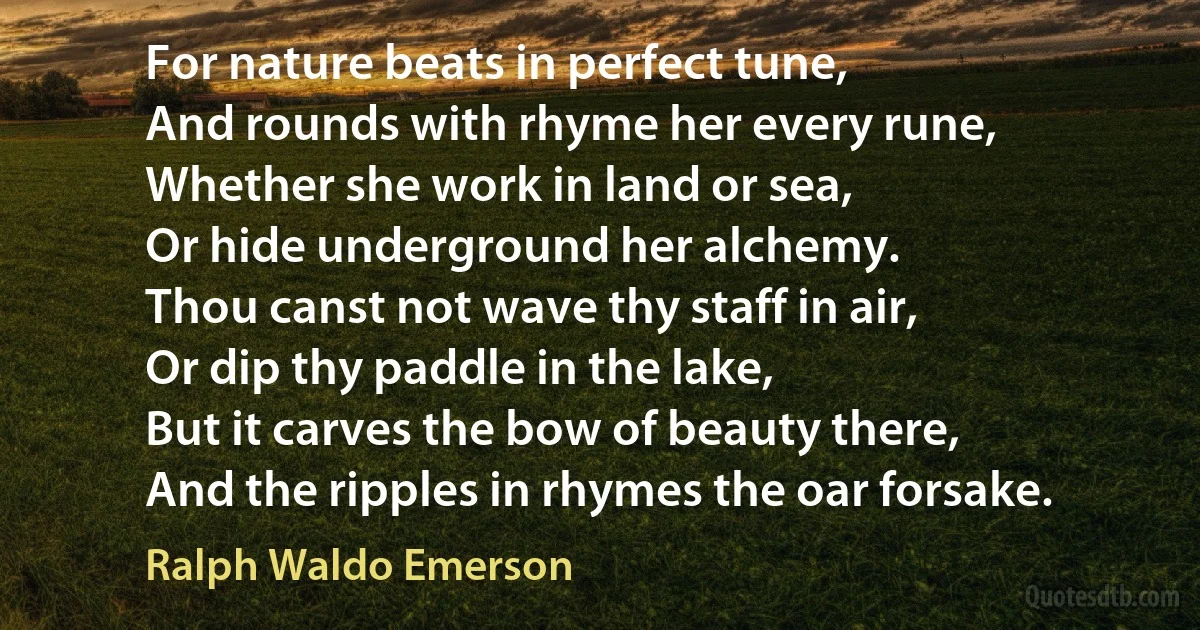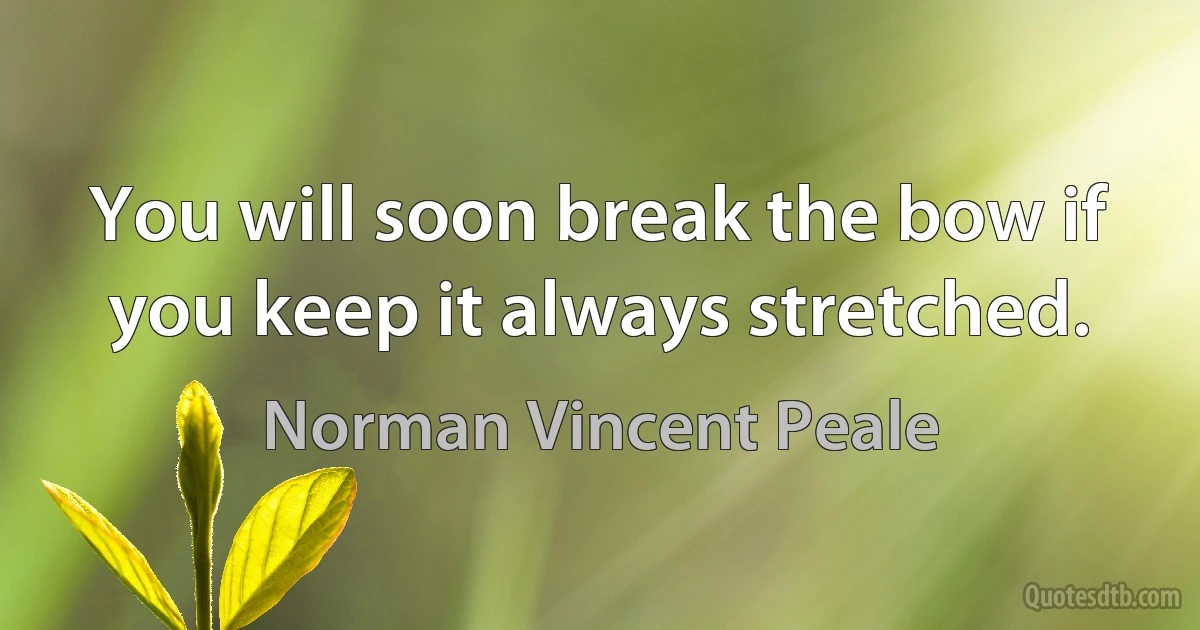Bow Quotes - page 7
The grass so little has to do,-
A sphere of simple green,
With only butterflies to brood,
And bees to entertain,
And stir all day to pretty tunes
The breezes fetch along,
And hold the sunshine in its lap
And bow to everything;
And thread the dews all night, like pearls,
And make itself so fine,-
A duchess were too common
For such a noticing.
And even when it dies, to pass
In odors so divine,
As lowly spices gone to sleep,
Or amulets of pine.
And then to dwell in sovereign barns,
And dream the days away,-
The grass so little has to do,
I wish I were a hay!

Emily Dickinson
I've done you a piece of good service, Nancy," he began: then seeing me, he acknowledged my presence by a slight bow. I should have been invisible to Hatfield, or any other gentleman of those parts. "I've delivered your cat," he continued, "from the hands, or rather the gun, of Mr. Murray's gamekeeper.

Anne Brontë
The second requirement of a virus-friendly environment – that it should obey a program of coded instructions – is again only quantitatively less true for brains than for cells or computers. We sometimes obey orders from one another, but also we sometimes don't. Nevertheless, it is a telling fact that, the world over, the vast majority of children follow the religion of their parents rather than any of the other available religions. Instructions to genuflect, to bow towards Mecca, to nod one's head rhythmically towards the wall, to shake like a maniac, to "speak in tongues" – the list of such arbitrary and pointless motor patterns offered by religion alone is extensive – are obeyed, if not slavishly, at least with some reasonably high statistical probability.

Richard Dawkins
In the days when the keepers of the house shall tremble, and the strong men shall bow themselves, and the grinders cease because they are few, and those that look out of the windows be darkened, I know one boy who won't be sweating. I intend to raise my coffin-lid briskly, throw a few things into an overnight bag, and, whistling something appropriate, prepare to meet my Maker.

Alan Coren
We are told of the honor of the army; we are supposed to love and respect it. Ah, yes, of course, an army that would rise to the first threat, that would defend French soil, that army is the nation itself, and for that army we have nothing but devotion and respect. But this is not about that army, whose dignity we are seeking, in our cry for justice. What is at stake is the sword, the master that will one day, perhaps, be forced upon us. Bow and scrape before that sword, that god? No!

Émile Zola
I seem to see before me the smiling faces of thousands of children some young and fresh and some wearing the friendly marks of age. But all children at heart and not an unfriendly face among them. And while I'm trying hard to speak the right word, I seem to hear a voice lifted above the rest saying you have made some of us happy. And so I feel my heart fluttering and my lips trembling, and I have to bow silently and turn away and hurry back into the obscurity that fits me best.

Joel Chandler Harris
There is a beautiful tale among the Australian aborigines which says that the bow and arrow were not man's invention, but an ancestor God turned himself into a bow and his wife became the bowstring, for she constantly has her hands around his neck, as the bowstring embraces the bow. So the couple came down to earth and appeared to a man, revealing themselves as bow and bowstring, and from that the man understood how to construct a bow. The bow ancestor and his wife then disappeared again into a hole in the earth. So man, like an ape, only copied, but did not invent, the bow and arrow. And so the smiths originally, or so it seems from Eliade's rather plausible argument, did not feel that they had invented metallurgy; rather, they learned how to transform metals on the basis of understanding how God made the world.

Marie-Louise von Franz
If we can keep our minds calm on the subject of the "Eternity of God," if reason does not totter on her seat at the contemplation of underived existence, it will be strange if any other mystery relating to God should disturb us. He who can bring his reason to bow reverently at the idea of a Being who had no beginning, is well prepared to receive any communication of His will.

Nehemiah Adams
How shall I hold on to my soul, so that
it does not touch yours? How shall I lift
it gently up over you on to other things?
I would so very much like to tuck it away
among long lost objects in the dark,
in some quiet, unknown place, somewhere
which remains motionless when your depths resound.
And yet everything which touches us, you and me,
takes us together like a single bow,
drawing out from two strings but one voice.
On which instrument are we strung?
And which violinist holds us in his hand?
O sweetest of songs.

Rainer Maria Rilke



